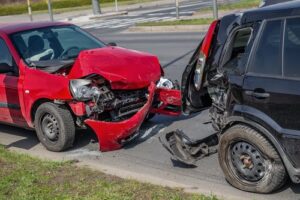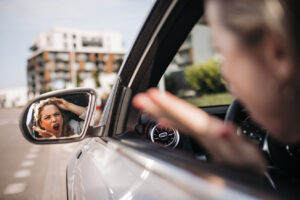We’ve all gotten angry while driving at one time or another. And chances are, you may have even brake checked by slamming on your brakes to get the person behind you to back off. This practice, known as brake checking, can be dangerous and cause a serious car accident.
So, is brake checking illegal in Washington, DC? And what happens if your crash results from this aggressive driving tactic?

For example, suppose you were driving behind a slow driver and getting frustrated. You try to flash your lights and get as close as possible, but to no avail. Without warning, the other driver suddenly steps on their brakes, causing you to brake, barely missing their rear bumper abruptly — a close call but still frustrating.
The main reason for brake checking is road rage. Brake testing, a dangerous driving behavior, often leads to serious accidents, particularly rear-end collisions. A road rage incident usually results in reckless behavior for all drivers involved. The frustration the driver may feel against the other driver will result in making an irrational decision, such as slamming on the brakes to make them back away. This behavior can endanger every driver on the road, resulting in an auto accident with serious injuries.
In short, yes, brake checking is illegal. Although there is no specific law in Washington, DC, about the practice, brake checking is considered reckless driving, which is unlawful in Washington, DC. According to DC Code § 50-2201.04, a person commits reckless driving if they display “a conscious disregard of the risk of causing property damage or bodily injury to any person.” They could receive a fine, jail time, or both if convicted of reckless driving.
Not only is brake checking illegal, but it’s also dangerous. Brake-checking accidents can often lead to serious injuries, such as traumatic brain injury, whiplash, back and neck pain, soft tissue injuries, and even death. In the event of a rear-end collision caused by brake checking, determining liability can be complex, as the lead driver’s actions may shift some responsibility.
Determining liability in a brake checking accident can be complex, as it often involves multiple parties and varying degrees of fault. Generally, the rear driver is typically found liable for the rear-end collision because they are expected to maintain a safe following distance. However, if the lead driver is found guilty of intentional brake checks, they will be held liable for any damages or injuries the accident causes.
Washington, DC, is one of the few jurisdictions that follow the contributory negligence doctrine. This law states that if a person is found at fault for the accident, even by the tiniest percentage, they will be unable to recover damage. If both drivers are found partially at fault, they cannot collect any losses from the other’s insurance company. This shared liability underscores the importance of safe driving practices and the severe consequences of brake checking.
If you were involved in a brake checking accident, your first step is to contact a car accident attorney in Washington, DC. They will be able to investigate the accident and help determine who was at fault for the accident. They can gather video footage and witness statements to prove fault. Schedule a free consultation today to learn your legal options.
If you’ve been involved in a brake checking accident, you may be entitled to compensation for your injuries and property damage. To seek compensation, gathering evidence, including photo or video footage, witness statements, and medical records is essential. You should also report the accident to the authorities and obtain a police report. A personal injury lawyer can help you file your claim, negotiate with the other party, and ensure you receive the compensation you deserve.
Remember, brake checking is a dangerous driving behavior with severe consequences, and you should not hesitate to seek justice if you’ve been affected by it. Taking these steps and contacting Regan Zambri Long can protect your rights and work towards a fair resolution.

Contact 911 as soon as possible and check to see if anyone was injured. If you feel safe, exchange information with the other driver and any witnesses. But if the other driver is hostile, stay in your vehicle until help arrives.
When law enforcement arrives, give them as much detail as possible. Do not admit fault.
Go to the hospital after the accident. Even if you feel fine after the car crash, you do not realize you were injured until the adrenaline wears off.
Keeping your emotions in check can be hard, especially if you are the lead driver. Here are some ways to avoid a stressful situation
A car crash can be extremely difficult and challenging to maneuver. It’s always best to speak with an experienced DC personal injury lawyer before contacting the insurance company. With a proven track record and years of experience, our Washington, DC car accident lawyers are here to help with your personal injury lawsuit.
Don’t wait — contact Regan Zambri Long today to schedule a free consultation. You do not owe us a fee unless we win your case.